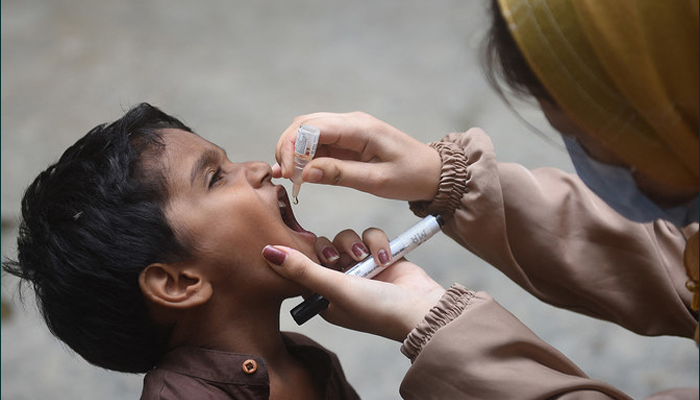Polio rate
Pakistan confronts multifaceted challenges, and one issue that has become the Lernaean Hydra of the modern age is the polio virus. The country is one of the only two countries in the world (after Afghanistan) where the virus is still an epidemic. And what is more troubling is the fact that Pakistan has been consistently trying to eradicate the virus from every nook and corner of the country, but this multiple-headed monster keeps returning, with more vengeance. As Pakistan records its fifth polio case this year, at least nine environmental samples collected from six districts across the country, including Karachi, Chaman, Peshawar, etc, have tested positive for wild poliovirus type 1 (WPV1), raising alarm bells among healthcare authorities; this year at least 64 samples were tested positive. These sample tests show that not all is well with the country’s anti-polio campaigns, and it needs to do more than what it has been doing until now to keep itself safe from the virus. The results also show a decline in the overall immunity of children, who are now at great risk of contracting the virus. This has led authorities back to where they started. Recent news reports also suggest that the Punjab government’s recently completed polio vaccination drive left around 294,000 children unvaccinated.
Medical experts say that the virus found here has come from Afghanistan; it resembles the poliovirus clusters found in the neighbouring country. While such detections are important to understand the origin of the virus and strengthen border controls to ensure that people travelling from Afghanistan are vaccinated, we also need to look at our shortcomings. For example, the high number of children left unvaccinated is alarming. The government cannot afford to display any leniency in this regard. It is true that Pakistan has a problem of vaccine hesitancy, where people remain reluctant to get their children vaccinated. But it is on the government to counter the dangerous propaganda and myths that influence people’s minds and force them to take decisions evidently dangerous for their children’s health.
The use of digital platforms could be beneficial for the government’s vaccination targets. Advertisements on the most-popular social networking apps can be a good way to fight against disinformation. Healthcare authorities can also team up with local businesses, announcing discounts or freebies on baby toys and clothes for every child who gets vaccinated. Authorities have to realize that distrust between people and the government is massive, and this is partly due to unchecked incidents of medical malpractices – at both private and public hospitals. The government has to work on building trust and ensuring people that their children will be safe. There should be complete transparency. Inaction by the government over the years left a vacuum that was filled by conspiracy theorists who have now created unjustified concerns among people. This cannot go on for long, and authorities will have to launch awareness programmes to ensure that no child is left behind.
-
 Extreme Cold Warning Issued As Blizzard Hits Southern Ontario Including Toronto
Extreme Cold Warning Issued As Blizzard Hits Southern Ontario Including Toronto -
 Lana Del Rey Announces New Single Co-written With Husband Jeremy Dufrene
Lana Del Rey Announces New Single Co-written With Husband Jeremy Dufrene -
 Ukraine-Russia Talks Heat Up As Zelenskyy Warns Of US Pressure Before Elections
Ukraine-Russia Talks Heat Up As Zelenskyy Warns Of US Pressure Before Elections -
 Lil Nas X Spotted Buying Used Refrigerator After Backlash Over Nude Public Meltdown
Lil Nas X Spotted Buying Used Refrigerator After Backlash Over Nude Public Meltdown -
 Caleb McLaughlin Shares His Resume For This Major Role
Caleb McLaughlin Shares His Resume For This Major Role -
 King Charles Carries With ‘dignity’ As Andrew Lets Down
King Charles Carries With ‘dignity’ As Andrew Lets Down -
 Brooklyn Beckham Covers Up More Tattoos Linked To His Family Amid Rift
Brooklyn Beckham Covers Up More Tattoos Linked To His Family Amid Rift -
 Shamed Andrew Agreed To ‘go Quietly’ If King Protects Daughters
Shamed Andrew Agreed To ‘go Quietly’ If King Protects Daughters -
 Candace Cameron Bure Says She’s Supporting Lori Loughlin After Separation From Mossimo Giannulli
Candace Cameron Bure Says She’s Supporting Lori Loughlin After Separation From Mossimo Giannulli -
 Princess Beatrice, Eugenie Are ‘not Innocent’ In Epstein Drama
Princess Beatrice, Eugenie Are ‘not Innocent’ In Epstein Drama -
 Reese Witherspoon Goes 'boss' Mode On 'Legally Blonde' Prequel
Reese Witherspoon Goes 'boss' Mode On 'Legally Blonde' Prequel -
 Chris Hemsworth And Elsa Pataky Open Up About Raising Their Three Children In Australia
Chris Hemsworth And Elsa Pataky Open Up About Raising Their Three Children In Australia -
 Record Set Straight On King Charles’ Reason For Financially Supporting Andrew And Not Harry
Record Set Straight On King Charles’ Reason For Financially Supporting Andrew And Not Harry -
 Michael Douglas Breaks Silence On Jack Nicholson's Constant Teasing
Michael Douglas Breaks Silence On Jack Nicholson's Constant Teasing -
 How Prince Edward Was ‘bullied’ By Brother Andrew Mountbatten Windsor
How Prince Edward Was ‘bullied’ By Brother Andrew Mountbatten Windsor -
 'Kryptonite' Singer Brad Arnold Loses Battle With Cancer
'Kryptonite' Singer Brad Arnold Loses Battle With Cancer




